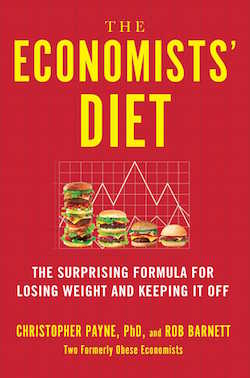Is This the Most Controversial Diet of 2018?

Whatever healthy eating plan you're into—ketogenic, Paleo, veganism, or something else entirely—there are probably a few aspects about it that can be challenging. (Every single person on Whole30 is nodding yes right about now.) But passing the bread plate or giving up meat has nothing on the diet outlined in The Economists' Diet, a new book written by two formerly obese economists, Christopher Payne, PhD, and Rob Barnett. The book applies economic principles, history and behavioral theory to dieting.
The authors attribute their weight-loss success to six core habits, which include eating one “square” meal a day or two lighter meals and weighing yourself every day. Otherwise, the nutritional advice is scant—aside from a few very general, broad-stroke recommendations, such as limiting carbs and sugar.
“We think the nutritional approach to dieting has pretty much failed,” says Barnett. Knowing what foods he should and shouldn't eat didn't stop him from becoming clinically obese, he says. The authors maintain that while most of us already know what a healthy diet looks like, many of us still make bad choices and choose the pleasure of over-consuming our favorite calorie-dense foods in the moment rather than thinking about our long-term weight loss or health goals. "It's called hyperbolic discounting," says Payne. "We overvalue the present and undervalue the future."
The basic premise of The Economists' Diet is that you learn how to eat intuitively based on daily weigh-ins. If the number on the scale creeps up or stops falling, you eat less—the authors call it “austerity eating”—the next day. In a nutshell, you learn to “budget” for splurges by skipping meals or having, for example, an apple for lunch. “If you can’t work out for yourself [what you should be eating] using the scale, in a sense you haven’t learned enough about your own body,” says Payne.
Yes, this sounds like the calorie-counting, deprivation-based approach that our mothers and grandmothers used—and that many modern-day nutritionists say ultimately offers diminishing returns. Dietician Brooke Alpert, RD, CDN, and founder of B Nutritious says the blood-sugar question is one to consider for anyone thinking of trying the approach that these male academics found so successful.

{{post.sponsorText}}
"One square meal a day is a great way to set yourself up for diet failure," Alpert says. "The goal of any healthy diet program should be to keep your blood sugar levels stable to help you make smart choices at each meal. Skipping meals all day and then attempting to have control over yourself at dinner just isn't going to happen."
"We’ve gotten a lot of pushback around the concept of weighing yourself every day. But the more you can get familiar with that number, the more you can use it as a guide or benchmark." —Rob Barnett
Daily weigh-ins also run counter to what many experts advise, including Janine Whiteson, MS, a nutritionist in private practice in New York. "Weighing yourself ever yday is not always the best idea, as fluctuations occur if you have had a salty meal, a few pounds of water could show up on the scale," she says. "That could derail you—and completely set you back thinking you have gained fat when it’s only water, which can be flushed out in a day."
The authors counter that the scale is still a useful tool and it's fear more than anything else that keeps people from using it. “We’ve gotten a lot of pushback around the concept of weighing yourself every day,” acknowledges Barnett. “There’s an emotional fear of doing something like that. But I say, ‘Look, its just a number, the more you can get familiar with that number, the more you can use it as a guide or benchmark.”
"Skipping meals all day and then attempting to have control over yourself at dinner just isn't going to happen." —Brooke Alpert, B Nutritious founder
Weigh-ins and skipped meals aside, Payne and Barnett do recommend adopting several “micro-habits” such as listening to your body’s signals of hunger, preparing more food at home, keeping a food diary and setting long-term and short-term goals, which are all more in line with current conventional wisdom. “We just hope that some people will read this book and be able to lose weight and sustain their weight loss, that for them, this will really click,” says Payne.
See how this diet stacks up against other popular eating plans. Regardless of which one you choose, cutting back on sugar is bound to make a difference. Here's how to do it.
Loading More Posts...